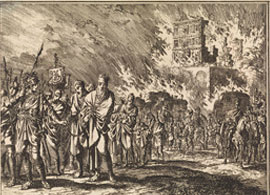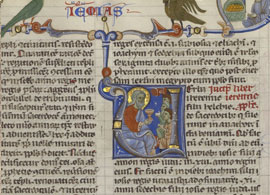Jeremiah Week 7
Bad, Bad News
Professor of Theology, Loyola University Maryland
Read this week’s Scripture: Jeremiah 21:1–25:38
18:26

 Enlarge
Enlarge
Our political mythologies celebrate the hero who persists despite all odds. When things look their bleakest, the hero perseveres, snatching victory from the jaws of defeat. Often help comes from an unexpected source. In the book of Jeremiah, everyone recognizes that this would be the right time for such a hero to emerge; it is the right time for the LORD to swoop in and save the day. But Jeremiah is absolutely clear: God is not going to save Judah. The Babylonians are closing in; the LORD is using Nebuchadnezzar to bring ruin on the people. There are only two choices: surrender and survive, or resist and die. There is no heroic option here.
The Judgment of Judah
This section begins a series of words of the LORD delivered by Jeremiah in and around Jerusalem. These words alternate between judgment and restoration, rupture and hope. Chapter 21 opens with emissaries sent by the king asking Jeremiah to inquire of the LORD on their behalf. Up to this point, one has the impression that the political and religious leaders of Jerusalem have persecuted Jeremiah and ignored his message. Now the Babylonians under Nebuchadnezzar are attacking. The king invokes God’s past saving activity, alluding to the Exodus. Perhaps God can be persuaded to act in a similar way on this occasion if Jeremiah will intervene (Jeremiah 21:1−2).
We do not learn Jeremiah’s own views about the message he delivers. The message, however, is unambiguous. Jerusalem will fall to Nebuchadnezzar. The devastation will be total, bloody, and relentless. This in itself is not new news. What is striking, however, is the use of the first person pronoun. All of this destruction is the work of the LORD. In the same way that the LORD is the one who fights against Pharaoh and who leads Israel to freedom, now the same LORD will fight against Israel. The emissaries from the king ask if the wonders of Exodus are still available to them now. Jeremiah’s answer is, “yes,” but now the “outstretched hand and mighty arm” (21:5) are directed against Judah.
In Jeremiah 21:8−10 the language of Deuteronomy 30:15−20 is used to offer the people at large an option. They can chose life by leaving the city and surrendering now. If they stay and fight, they have chosen death. Following the will of God now requires submission to Babylon. The people are called to abandon any notions of patriotism, to surrender and submit. That is the only way to escape with one’s life.
A Critique of the Monarchy
After these words to the people at large, the final verses of chapter 21 return to address the monarchy. It becomes clear that the purpose of the king is to secure justice for the people, particularly those who are oppressed. Practicing justice is the only way to secure the future of the nation. There are no alliances, strategies, or fortifications that can help. Just do justice. Then the city will flourish.
Just in case Jeremiah 21:11−12 might give the impression that Jerusalem is in the clear, verses 13−14 remind the king that the city is under God’s judgment. They have been complacent, idolatrous, and oppressive. Now God will send fire.
All of chapter 22 and the first verses of chapter 23 focus on the monarchy and specific kings. The ruler bears the bulk of the responsibility for the state of the nation. The health of the religious, commercial, and legal aspects of society rely first and foremost on the king. This section offers a criticism of the monarchy as a whole (22:1−10) and of actions of specific kings.
Do justice; protect the foreigner, the fatherless, and the widow; do not shed innocent blood. These are fairly standard prerequisites within Scripture for a just society. Certainly one might say more about this, but one would not want to make justice anything less than this. The future of the monarchy depends on these things. If the kings of Judah will observe them, then they will persist on David’s throne. If they fail at this, then they will have abandoned the covenant and God will bring ruin on them and the city. Interestingly, Jeremiah 22:9 links the practice of justice to the worship of the LORD alone. The failure of justice is linked to idolatry. The passage does not explain the nature of this connection, and this connection may be complex and varied in different times and places. Nevertheless, idolatry and injustice are bound together in this verse. Based on the entirety of Jeremiah, it is clear that Judah’s idolatry makes them blind and deaf in certain important respects. They cannot properly see themselves, their political situation, and their current situation relative to the LORD. They cannot hear and respond appropriately to God’s word delivered through Jeremiah. We should not expect that such idolatry-induced blindness and deafness is limited to Judah’s interactions with God. Presumably, this blindness and deafness works its way out in Judah’s social and economic life, too. In this way, perhaps we can imagine how idolatry and injustice are tied together.
The rest of this chapter continues a critique of the monarchy through accounts of specific kings. The first is Shallum (generally referred to as Jehoahaz elsewhere), the son of Josiah. Josiah, the dead king of verse 10, was a reliable and faithful king who died in battle (2 Kings 23:1−30) with the Egyptians. His son Shallum/Jehoahaz was not faithful and was quickly deposed by the Egyptians and taken into exile (2 Kings 23:31−35).
Shallum appears to have adopted the idea that the quality of his reign would be measured by the luxurious nature of his palace. He built this luxury on the backs of conscripted labor. In contrast with his father — who defended the cause of the poor and needy — Shallum proved to be a self-absorbed king, immersed in injustice. From the perspective of the LORD, the dead Josiah is better off than the living. One should not mourn for him. Rather, people should pity those who live under his unjust son, who will die unmourned (Jeremiah 22:10−19).
After a brief interlude that directs judgment on the community as a whole (Jeremiah 22:20−23), Jeremiah returns to addressing specific kings. Jehoiachin was the son of Jehoiachim and the grandson of Josiah. According to 2 Kings 25:8−17, he only reigned for a few months before Nebuchadnezzar took him into exile, along with his family and much of the wealth of Jerusalem. Here, the LORD announces that even if Jehoiachin were a royal signet ring on the hand of God, God would throw him away (Jeremiah 22:24−30). Perhaps because there is no king left, the LORD turns to address “the land” (Jeremiah 22:29). The land is instructed to close the account on Jehoiachin, treating him as childless, the end of the Davidic line.
This specific word against Jehoiachin is followed immediately by a more general criticism of the leaders or “shepherds” of Judah (23:1−8). Because these leaders have not done their jobs well, because they have not led with righteousness, the sheep have been scattered. The text seems quite clear in asserting that although the LORD has caused the exile or the scattering of the sheep of Judah, it is the shepherds, the leaders of the people, who are responsible for this.
Promise of Restoration
This word of judgment regarding the shepherds also contains promises of restoration (Jeremiah 23:5−8). “In the days to come,” the LORD who has caused the scattering of the sheep will bring them all back home. The exiles will return and flourish. Moreover, God will establish a new Davidic shepherd, a king who will rule with wisdom, justice, and righteousness. This will be such an amazing event that the return of the exiles will outshine the Exodus as one of the LORD’s redemptive events (23:7−8).
This promise of restoration has two important theological components to it. The first concerns this promised Davidic king who will rule with wisdom, justice, and righteousness. Christians will naturally want to see in this promise an anticipation of the coming of Christ. As long as they recognize that such prophetic promises might admit of numerous fulfillments, Christians should not hesitate to read these promises in the light of Christ. The great blessing of prophetic speech is that it speaks into ancient contexts and continues to speak in subsequent contexts as well. The alternative is to have prophetic speech frozen in one particular historical period, incapable of addressing the needs of God’s people beyond a very narrow set of historical confines. Once believers adopt the idea that prophetic speech speaks into its own time and continues to speak to other times, they must then discern in community when and how such speech is relevant to the contexts in which they find themselves. This is not always easy, and the history of the church is marked with failures in this regard. Nevertheless, God delights in forgiving our failures in this area. It would seem then that Christians are far better served by developing their capacities to hear prophetic speech faithfully in their own contexts, including their capacities to recognize and repent of their interpretive failures, than by trying to limit prophetic speech to one single point in time.
The second interesting observation from these verses is that God restores both Judah and Israel (Jeremiah 23:6). The divided kingdom is restored and made one. This must be a sign of hope for Christians who inhabit a deeply fractured body of Christ. That is, God’s desire and promise to reunite divided Israel may foreshadow God’s desire and promise to reunite the divided body of Christ.
False Prophets
The rest of chapter 23 is a full frontal assault on the prophets who opposed Jeremiah and offered an alternative to his message. It is useful to remember that Jeremiah was not the only one in Judah claiming to speak a word from the LORD. There were numerous prophets. Many tried to counter Jeremiah’s unrelenting message of judgment with messages of hope and prosperity. No matter how these prophets seek to justify the divine origins of their messages, the LORD through Jeremiah repudiates them all and promises harsh judgment on those who falsely speak in God’s name. The images here reflect God’s comprehensive rejection of these messages of false peace.
The larger question concerns the people of God. How can they determine which prophets are speaking the truth? Is it Jeremiah or these other prophets? The Old Testament as a whole has an interest in this general question of how to tell true from false prophecy. Deuteronomy offers the answer: The words of a true prophet come true; the words of a false prophet don’t come true (Deuteronomy 18:21−22). Of course, this is correct, but it does not really help the people of Jerusalem at the time they most need it. Waiting to see who turns out to be right is not really an option. It would seem that discerning the true prophet from the false prophet largely requires a people whose life with God is faithful, just, and true. This is precisely not the case with the people of Judah. The situation reflected in Jeremiah 23 is typical of almost all of the prophetic books of the Old Testament. When it is most crucial for the people of God to be able to discern the true prophet from the false prophet, the people’s sin has disabled them for just this task. It is really much better never to need a prophet in the first place.
Good and Bad Figs
After the withering criticism of the prophets in the later part of chapter 23, chapter 24 carries a message of hope for those whom Nebuchadnezzar has taken into exile. At the outset of the chapter, we learn that Jehoiachin, along with most government officials, the craftspeople, and skilled workers have all been taken back to Babylon by Nebuchadnezzar. There, the Babylonians can keep an eye on them and they can be put to work in service of the Babylonian empire. Jeremiah, who has remained in Jerusalem under the rule of Zedekiah (Jehoiachin’s uncle), is presented with a vision of two baskets of figs. One basket is filled with figs ready to be eaten. The other is filled with rotten figs that nobody could eat (Jeremiah 24:1–3). These two baskets represent the two communities: one in exile, one in Jerusalem.
One might naturally expect that those in exile face the greater humiliation. They have clearly encountered God’s judgment in direct and irrefutable ways. It would seem that they are the basket of rotten figs (Jeremiah 23:5). Nevertheless, contrary to what one might expect, the good figs represent the exiles. The LORD is committed to caring for them and ultimately bringing them back from exile. Moreover, they will come back with new devotion to the LORD (Jeremiah 24:7).
The bad figs represent Zedekiah, his officials, and those who remain (Jeremiah 24:8). If these left in Jerusalem felt any sense that their standing with God was better than those who suffered the judgment of exile, this word from the LORD makes it clear this is not the case. Life for those remaining in the land will be harsh, accompanied by violence and heartache. In this way, the LORD makes it obvious that exile is God’s will for Judah, and through exile God’s purposes can be accomplished.

 Enlarge
Enlarge
The Wine of God’s Anger
Chapter 25 begins with a fairly precise historical situation for Jeremiah’s oracle. Verse 1 dates this oracle to 605 BCE. This is the first year of Nebuchadnezzar’s reign. Jeremiah then situates his own prophetic activity beginning in 626 BCE, 13 years after the beginning of Josiah’s reign. As Jeremiah relates it, he has relentlessly brought the word of the LORD to Judah, but the people have not listened to him. He is not alone. The LORD has regularly sent prophets, and the people have failed to listen.
No matter who has delivered it, the message has remained the same: Turn from evil practices and the worship of idols. Only in this way can the Judeans remain in the land. Verses 1−7 describe a situation of deep-seated unrighteousness among the people leading to multiple prophetic calls to repent. Verses 8−14 lay out an announcement of judgment to the people of Judah. The striking element in this is that Nebuchadnezzar is identified as the servant of the LORD, the LORD’s chosen instrument of judgment. This is similar to Isaiah’s announcement that God would use Cyrus to bring rescue to the people (Isaiah 45:1). The notion that God might use Judah’s archenemy to execute judgment on Judah must have been a bitter word to hear. One of the interesting things about God’s description of this coming judgment is the elimination of the sounds of a happy, prosperous life. No joking, no weddings, no sounds of the mill and daily work.
This announcement of judgment leads to a promise of restoration after 70 years. The instrument of God’s judgment, the king of Babylon, now becomes the subject of God’s judgment (Jeremiah 25:12). The LORD is clear that there is no virtue in the Babylonians that make them particularly suitable for God’s purposes. On the contrary, they, too, are a sinful people and will come under God’s judgment. Indeed, as the next section indicates, all the world is under God’s scrutiny and is liable to judgment.
After announcing a specific judgment on Babylon, Jeremiah receives a new set of instructions in 25:15−29. The LORD instructs Jeremiah to take a cup of the wine of God’s anger. He is to make all the of nations drink from it. The list begins with Jerusalem and Judah; it ends with Babylon. In between, we find a list of the nations of the ancient Near East. Nobody can avoid drinking the wine of God’s anger. All will be punished for their misdeeds. This prosaic discussion turns to a more general and poetic account of God’s coming judgment in verses 30−38. If there is a single theme that ties chapter 25 together it may be this: The LORD is God of all. Even if Judah is first to receive judgment, it still seems that the LORD holds all nations responsible for their conduct. Unlike the beginning chapters of Amos, we do not learn what particular deeds the nations have done. Instead, the emphasis falls on God’s sovereignty.
Questions for Further Discussion
- Why is it difficult to tell the difference between a true and a false prophet? In what situations today do you see a struggle between competing “prophetic” voices?
- What do you think of the idea that “exile is God’s will for Judah, and through exile God’s purposes can be accomplished”? Why is exile necessary? Why do you think God considers the Judean exiles as the “good figs”?
- Read Jeremiah 25:8–14. Do you think it is fair for God to use Babylon to carry out judgment against Judah, and then to punish Babylon for carrying out that judgment? What does this say about God or God’s will?
<<Previous Lectio Back to Jeremiah Next Lectio>>

This work is licensed under a Creative Commons License.




